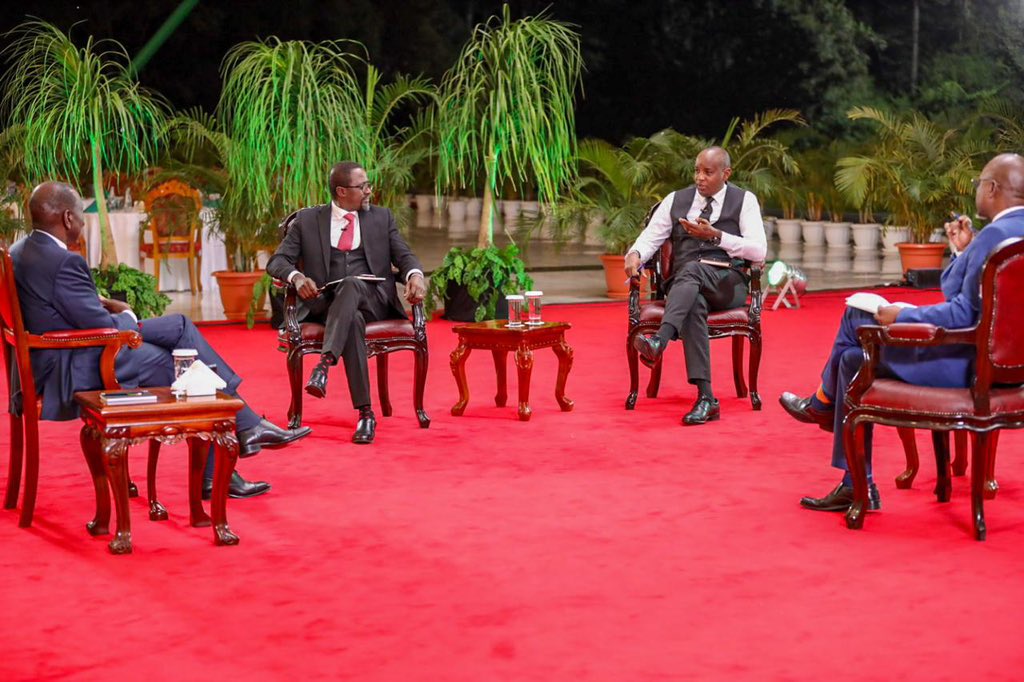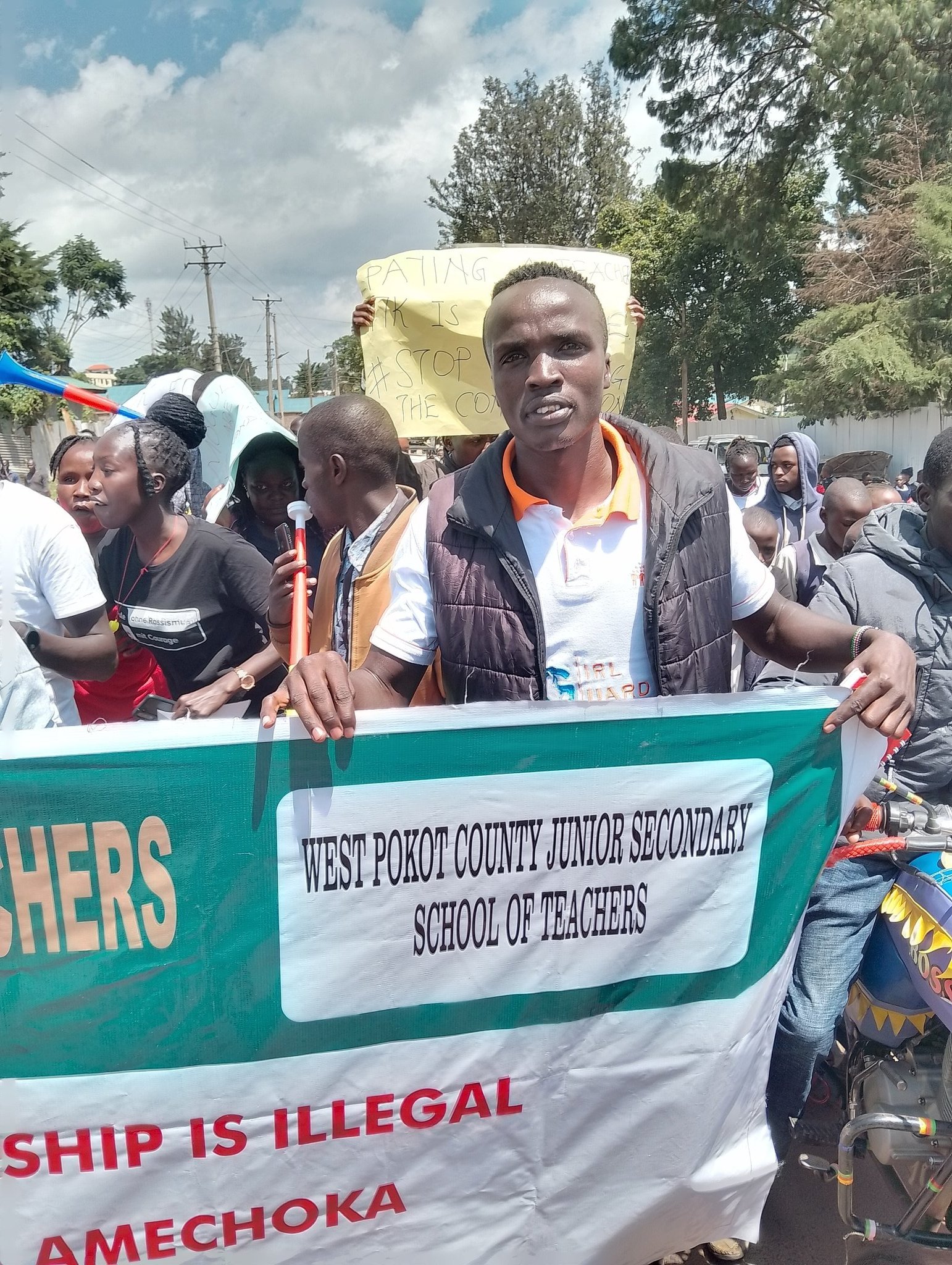
- Junior secondary school (JSS) teachers in Kenya have been on strike, demanding employment on permanent and pensionable (PnP) terms following a court ruling that found the internship program unconstitutional, illegal and discriminatory.
- The strike by the 46,000 JSS intern teachers has paralyzed learning in thousands of public schools, affecting over 2.5 million JSS students nationwide.
- Despite the disruption, the Kenyan government has claimed that learning is still progressing through alternative teaching arrangements, though the impact of the strike on student learning remains a concern.
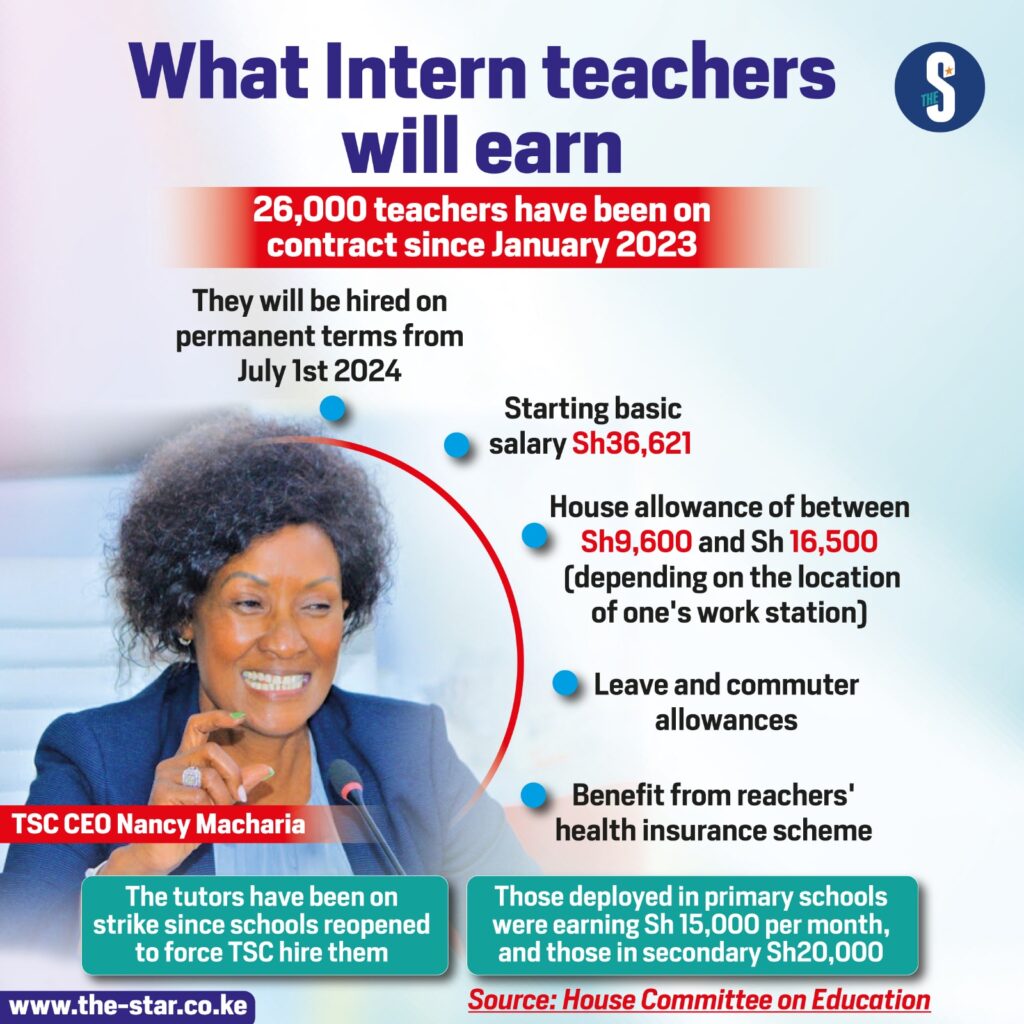
Demands of JSS Teachers
- The JSS teachers are demanding three key things from the Teachers Service Commission (TSC):
- Compensate all 46,000 intern teachers for the 16 months they served without being paid]
- Confirm all 46,000 interns on permanent and pensionable (PnP) terms
- If the teachers cannot be confirmed, then terminate their internships
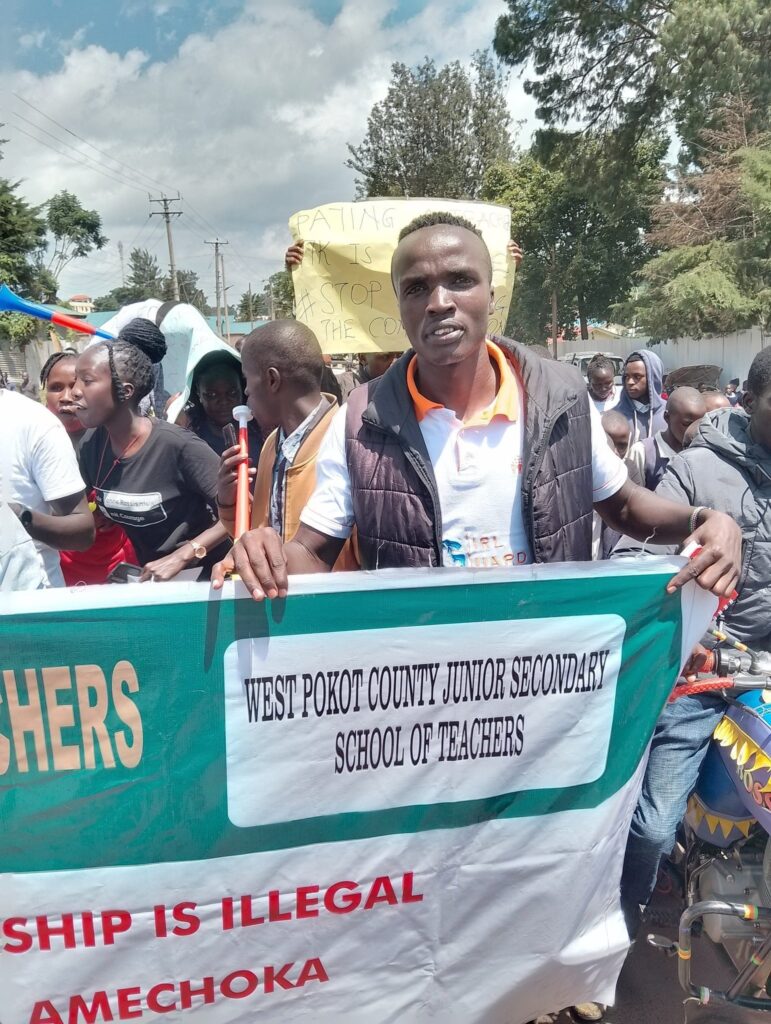
Legality of the Strike
- The teachers have stayed away from school demanding employment on permanent and pensionable (PnP) terms following a court ruling last month that found the internship program unconstitutional.
- Some 38,863 JSS teachers are currently on contract, while only 687 are on PnP terms.
- The TSC has obtained a stay on the court’s ruling until August 1, 2024, as it pursues an appea.
- However, the JSS teachers’ union, Kuppet, has argued that the court has already ruled the internship program to be illegal, and the TSC should issue employment letters on PnP terms before the teachers can resume work.
Impact on Student Learning
- The strike has resulted in thousands of JSS classrooms being left without teachers, leaving students idle and unable to continue their education.
- The disruption to learning caused by the strike can lead to knowledge gaps, emotional distress, and long-term negative impacts on students’ academic progress.
- The strike has occurred amid prolonged school closures due to flooding nationwide, further exacerbating the impact on student learning.
Government’s Response
- The government has claimed that the disruption caused by the strike has been mitigated through alternative teaching arrangements, though the extent to which this has been effective remains unclear.
- The TSC has now threatened to terminate the contracts of 7,357 JSS teachers who have been absent from work, with the commission citing professional misconduct.
- This move by the TSC risks further exacerbating the understaffing in JSS, which already has a high proportion of teachers on contract rather than permanent terms.
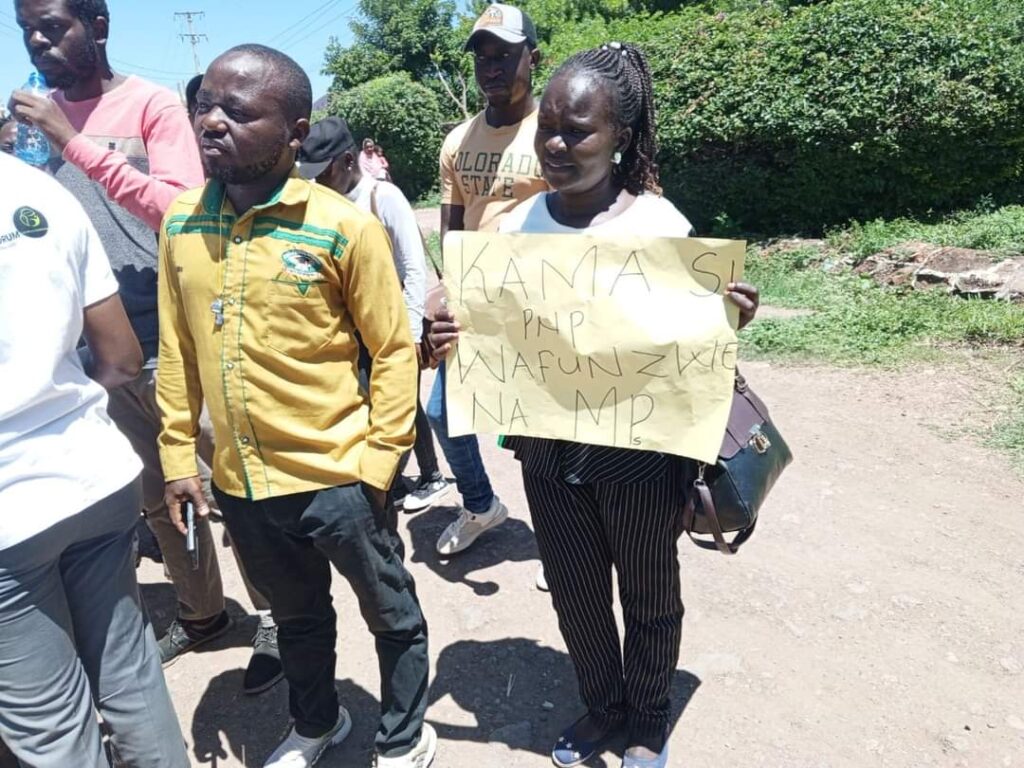
Broader Context and Implications
- The JSS teachers’ strike is part of a broader trend of teacher activism and labor unrest in Kenya and globally, with teachers often demanding better pay, working conditions, and resource allocation for education.
- These strikes can have significant consequences for student learning and the education system as a whole, underscoring the need for proactive measures to address the underlying issues and ensure continuous and equitable education.
- Resolving the JSS teachers’ strike will require addressing systemic issues, such as adequate and equitable funding for education, as well as fostering open communication and accountability among all stakeholders, including the government, teachers, and the community.
Impact on JSS Students Amid Strike and Floods
Disrupted Learning and Idling Classrooms
- The absence of JSS teachers due to the ongoing strike has left thousands of classrooms without instructors, leaving students idle and unable to continue their education.
- At schools like AIC Visa Oshwal Primary, Kilifi Primary, and Seguton Primary, the lack of contracted JSS teachers has forced the schools to rely on trainees and primary school teachers to manage the JSS students.
- This situation has resulted in significant disruptions to the learning process for JSS students, with many simply left to idle in their classrooms without any meaningful educational activities.
Exacerbated by Nationwide Flooding
- The JSS strike has occurred concurrently with widespread flooding across Kenya, leading to prolonged school closures that have further compounded the impact on student learning.
- The combination of the strike and the flooding has created a perfect storm, leaving JSS students with severely limited access to education and facing the risk of long-term academic setbacks.
Emotional Distress and Knowledge Gaps
- The disruption to their education can lead to emotional distress, loss of routine, and anxiety among JSS students, in addition to the risk of developing knowledge gaps that may be difficult to fill.
- The inability to consistently attend classes and engage in meaningful learning activities can have long-term negative implications for the academic progress and overall development of JSS students.
Lack of Adequate Support
- With the limited number of teachers available, JSS students are not receiving the individualized attention and support they need to thrive academically.
- The few permanent teachers posted to JSS are reported to be overworked and struggling to manage all the learners, further exacerbating the challenges faced by students.
Concerns for the Future
- The disruption to JSS education caused by the strike and flooding raises concerns about the long-term impact on these students’ academic and personal development.
- There are fears that the current generation of JSS students may face significant setbacks, potentially wasting a crucial year of their educational journey.
In summary, the JSS students are bearing the brunt of the ongoing strike and the concurrent flooding, facing disrupted learning, emotional distress, and a lack of adequate academic support – a situation that threatens to have long-lasting consequences on their educational outcomes and overall well-bein
Primary School Teachers Stepping in to Manage JSS Students
AIC Visa Oshwal Primary School
- At AIC Visa Oshwal Primary School in Kabarnet, Baringo County, the six contracted JSS teachers did not report back to work when schools reopened.
- To address the shortage, the school’s headteacher, Mr. William Bowen, had to hire four trainees who are on teaching practice to teach the 386 JSS learners at the school.
Kilifi Primary School
- Similarly, at Kilifi Primary School in Kilifi County, the school has relied on teachers hired by the board of management, as well as trainees on teaching practice, to manage the 168 Grades Seven and 186 Grade Eight students.
Seguton Primary School
- At Seguton Primary School in Kabarnet, the two contracted JSS teachers have not returned to work.
- To avoid the JSS learners, numbering 80, from idling the whole day, primary school teachers have been forced to step in and assist the lone permanent teacher at the school.
Challenges and Concerns
- The reliance on primary school teachers and teaching trainees to cover the JSS classes has raised concerns about the quality of education being provided to these students.
- KUPPET’s Kilifi branch vice executive secretary, Zacharia Opollo, expressed frustration, stating that headteachers are desperately seeking university students to fill the teaching gaps, and that the ongoing situation is “wasting a whole generation” of students.
- The lack of specialized JSS teachers, who are familiar with the curriculum and teaching methods for this age group, could compromise the students’ learning experience and academic outcomes.
In the face of the JSS teachers’ strike, primary school teachers and teaching trainees have been pressed into service to ensure that JSS students do not completely miss out on their education. However, this temporary solution raises concerns about the quality of instruction and the long-term impact on the students’ academic progress.
Measures to Ensure JSS Students’ Academic Progress Despite Teacher Shortage
Alternative Teaching Arrangements
- The government has claimed that the disruption caused by the JSS teachers’ strike has been mitigated through alternative teaching arrangements, though the extent of their effectiveness remains unclear.
- Some schools have resorted to hiring teaching trainees and primary school teachers to cover the JSS classes, though this has raised concerns about the quality of instruction.
Redistribution of Primary School Teachers
- The Teachers Service Commission (TSC) has announced plans to redistribute primary school teachers to accommodate the surplus of JSS students, in an effort to ensure continuous learning.
- This measure aims to provide more teachers to manage the JSS classes, though it may lead to challenges in the primary school system as well.
Targeted Incentives and Support
- The government has suggested providing targeted incentives and support to attract and retain JSS teachers, including bonuses and housing subsidies.
- These efforts are intended to boost the teaching workforce and ensure that JSS students have access to qualified and experienced educators.
Flexible and Responsive Staffing Models
- State and district leaders have been encouraged to support school administrators, particularly in high-need areas, by providing sample schedules and staffing models that can adapt to emergencies and minimize disruption to student learning.
- This approach aims to help schools develop differentiated instructional roles based on their specific needs and challenges.
Monitoring and Transparency
- Experts recommend that states and districts collect and publish comprehensive data on teacher vacancies and turnover, which can help identify and address the root causes of teacher shortages.
- Transparent data can also enable targeted interventions and support for schools and communities most affected by the shortage of JSS teachers.
While the government has outlined some measures to mitigate the impact of the JSS teachers’ strike, the effectiveness of these efforts remains to be seen. Ensuring the continuous and quality education of JSS students will require a comprehensive, long-term approach that addresses the systemic issues underlying the teacher shortage.
Conclusion
- The ongoing JSS teachers’ strike in Kenya has disrupted learning for millions of students, highlighting the need for a collaborative and holistic approach to addressing the underlying issues in the education system.
- Resolving the strike will require the government to engage constructively with the teachers, address their legitimate demands, and implement systemic reforms to ensure a stable and supportive environment for both educators and students.



